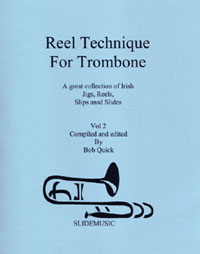Reel Technique: A Review
 Reel Technique for Trombone. Compiled and edited by Bob Quick. Slidemusic, Ireland. 2 volumes.
Reel Technique for Trombone. Compiled and edited by Bob Quick. Slidemusic, Ireland. 2 volumes.
These books contain dozens of unaccompanied Irish tunes including jigs, reels and songs. Each volume contains about 20 short selections in a variety of meters with the occasional lyrical interlude. Although the tunes appear to segue continuously through the entire book, one can probably assume that extracting 2 or 3 for a recital is a reasonable approach.
The editor, Bob Quick, states in his introduction that "Irish fiddle and whistle players perform these tunes at an incredible tempo." Assuming the goal is to emulate the energy and technique of the original version, some listening and research would be valuable. For example, should one assume a multiple tongue throughout or a comfortable single tongue tempo? Taken at a multiple tongue tempo these little character pieces become quite a challenge indeed and would require considerable work to prepare. The question becomes whether they would sound stylistically appropriate at a slower (more trombonistic) tempo? This question is essential to the effectiveness of these pieces because they appear to be specifically suited to their original instrumentation. A thoughtful approach will be needed to preserve the integrity of the original music within the context of a reasonable tempo and good musicianship.
This process of adapting or transcribing music from other sources is an important skill for trombonists since our literature is more limited than other instruments. For example, adapting Bach's Cello Suites for performance on trombone is a challenging and valuable musical experience. Ultimately, Bach's craftsmanship shines through and affords the trombonist a glimpse of the master's brilliance. Taken through the same process, Reel Technique for Trombone reveals itself as documentation of a rich Irish folk song heritage, however, the tunes do not offer (nor do they claim to offer) a profound musical experience. For this reason they are probably best enjoyed for their technical challenge and as whimsical musical diversions.
